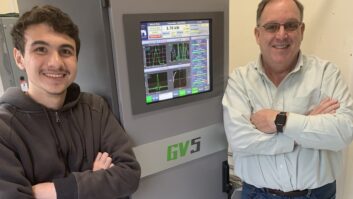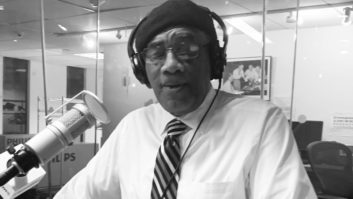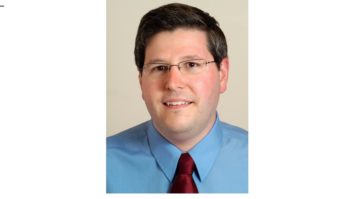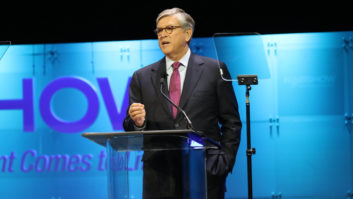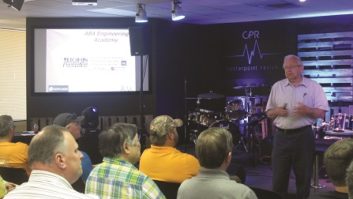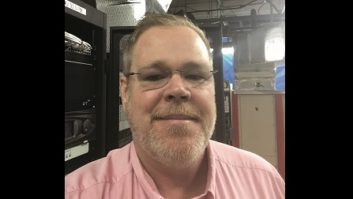Contrary to Common Wisdom, Radio Does Have Youthful Engineering Talent
(click thumbnail)Aaron Ishmael, 23, is chief engineer of KPQ(AM/FM) in Washington state.“Boneless ribs.” “Hot chili.” “Original copy.”
To that list of oxymorons one might be tempted to add “young engineer.”
We so often hear the lament: “Where will the next generation of radio engineers come from?” The stereotype – justified or not – is of the engineer as a grizzled 60-year-old who grouses that the new-fangled computer gear isn’t as reliable as his old Ampex machines and who will leave no replacement behind when he retires.
No doubt radio engineering has its gray elders. But where is the bright young talent? Radio World asked around; and we found to our pleasure no shortage of promising younger engineers active in the industry. We thought we’d tell you about some of them. Maybe in 2040, these will be the guys grousing about how they miss their iPods and hard-drive automation systems.
Big Apple, young seed
Rob Bertrand, 27, is a full-time technician who came to Infinity station WCBS(AM) in New York in April of 2005.
“I’m more or less self-taught,” Bertrand said. “But I have always been electronically inclined, beginning at age 13 when I started my own alarm company, which later helped pay for college. But I fell in love with radio at my college station, now known as RLC-WVPH(FM).”
When Bertrand got to Livingston College at Rutgers University in New Jersey, the AM carrier current station had fallen out of favor with the FM-oriented student body.
“I found that nearby Piscataway High School had an FM frequency they were only using four hours a day. WVPH was in trouble and facing a license challenge from a local religious group, so in the fall of 1997 we formed a partnership to share the frequency and transmitter.
“It was that experience of literally saving a station that forced me to learn about audio and RF.”
After four years at Greater Media stations WMGQ(FM) and WCTC(AM) in New Brunswick, Bertrand landed in the nation’s biggest market nearby. At WCBS, he is the youngest member of the engineering staff.
“They have a number of great engineers who are not that far from retirement, and I need to learn the entire operation so I can support whatever they need me to do. I’m responsible for anything that spits out audio, and a lot of that now is computers,” he said.
WCBS is a digital plant with Klotz consoles, a Burli software package in the newsroom and Prophet Systems automation handling commercials. Bertrand also spends time at the shared WFAN(AM)/WCBS transmitter location at High Island, N.Y., with Ken Beiber, who is transmitter supervisor for sister station WINS(AM) and WCBS, and Dick James from WFAN.
“Here we have a GM, Steve Swenson, who recognizes the need to develop new engineering talent and takes the lead in recruiting,” he said. “Steve took an unprecedented step in hiring someone like me who had been working nine years, with only four of those outside college. But that is what it will take to ensure the long-term viability of stations like WCBS.
“I am also thankful to Milford ‘Smitty’ Smith at Greater Media for his mentoring and guidance over the years. We need more people like these guys to start internships and part-time positions to get more young people into the industry.”
All in the family
Ben Ary is chief engineer for Clear Channel in Columbus, Ohio.
“My father Jim was an engineer for Taft, Great American, CitiCasters, Jacor and Clear Channel. I grew up going to work and to the transmitter site with him on weekends,” he said. “I got right into it after I graduated high school and got my two-year associates degree in electronic engineering from Marion Technical College while I was working in radio.”
Ary, 29, also attended a couple of Harris transmitter schools for additional training before receiving his SBE certification. He encourages formal education for others in his age group.
“When you go to college, take IT and networking classes,” he said.
Ary’s mentors include his father and Greg Savoldi, now regional director of engineering at Clear Channel, Columbus.
“This is a fun field and I never have a boring day,” said Ary, who also handles chief engineer duties at four radio stations in nearby Marion, Ohio.
An Ary associate is Clear Channel staff engineer Andy Mika, 26, whom Ary describes as intuitive, smart and driven. Mika was literally “grandfathered” into the business.
“My grandfather introduced me to electronics,” Mika said. “He was an electrical engineer and let me fix broken equipment and taught me to solder. This combined with my love for audio led me to a career in radio.
“I started on the air at my college station at Otterbein in Westerville, Ohio,” said Mika; the station was WOBN(FM). “I didn’t get too involved with the RF side, but I liked to fix things and problem-solve. When I got there they were still using cart machines and CD players, and they didn’t have any automation.”
Mika installed a Prophet Systems NexGen while he was a student. He later received broadcast and audio degrees and finished a four-year degree in communications with a broadcast focus.
What age gap?
In the northwest corner of the country you’ll find Fisher Radio, Seattle. The assistant engineer there is Gabe Joseph, 26, who began his career as an on-air reporter, news anchor and disk jockey.
“I started at Cascade Radio Group in Bellingham, which included KGMI(AM)/KISM(FM),” he said. “I was attracted to engineering because I have technical abilities. The program director there, Greg Roberts, encouraged me to stick with that part of the industry.”
Joseph was self-taught; he later took classes in computer network engineering and electronics. “But I must say that one advantage to the analog days was that if you had a cart machine break, you had another you could substitute,” he said. “And it didn’t bring down the whole station.”
Because he didn’t have a lot of RF experience, Joseph began working with older engineers. His main focus today is on automation systems, consoles and studio work.
“We have a TV station here too, and those guys can help me learn more about RF and other traditional engineering principles,” he said.
Joseph believes that whether the department is sales or engineering, handling people represents the biggest issue he has to face.
“Sometimes we’ll have jocks complain about equipment they believe is broken,” he said. “But really, they just don’t know how to use it. So I spend a lot of time helping them.”
He is concerned about the future of radio engineering and the people who will become leaders.
“A lot of the guys are in their 40s and 50s; and when they retire I’m not sure who the engineers are going to be,” he said. “Part of the problem is that young people are going into computer fields and there is very little encouragement by management to recruit new engineers.”
Consolidation, according to Joseph, may also be part of the problem.
“It used to be that an engineer oversaw two stations and probably had an assistant,” he said. “Consolidation means that one engineer has even more stations to deal with and has no assistant – if the station is lucky enough to have an engineer at all. Contract engineers have to be brought in to do the heavy stuff like climbing towers.
“And we wonder why it is getting harder to find qualified applicants.”
Joseph said that the mark of a good engineer is that he or she wants to teach other people and leave good documentation. He also believes that the broadcast business is not for everyone.
“I don’t think I would encourage someone to go into radio unless they really want to because it means hard hours and low pay in the beginning,” said Joseph. “But if you’re dedicated it can be very rewarding.”
Networking
Here’s something to ponder: The children of the Reagan era now are becoming chiefs.
Wescoast Broadcasting’s KPQ(AM/FM), Wenatchee, Wash., is home to Chief Engineer Aaron Ishmael, age 23. He too was brought into the business by his father, a program director.
“I am mostly self-taught, but I do have an associate of science degree from Red Rocks Community College in Lakewood, Colo.,” he said. “I enjoy making things better, whether it’s a new studio project or revitalizing a transmitter site. I spent some time in programming and sales, but I was never as good at those as I was at engineering.”
Ishmael credits Brad Hart and Gary Nakashima, chief and assistant chief engineers at Jefferson Pilot Communications in Denver, and Jay White, corporate director of engineering for Morris Communications, all of whom have helped him in his career.
“Networking with others is so important,” he said. “If you don’t know the solution to a problem, chances are someone else has faced the same thing and has the answer.”
Ishmael is in the process of renovating a studio that is 17 years older than he is.
No two days alike
At 45, Dave Adams is almost twice the age of Aaron Ishmael, and thus bridges the gap between the youngest and the oldest in the engineering world. He is chief engineer at KSRV(AM/FM), Ontario, Ore. owned by FM Idaho Co.
Adams has been at his stations five years longer than Ishmael has been alive. He enjoys living and working in his hometown. After a brief stint in New Zealand he returned to the United States with a renewed appreciation for our FCC. Adams feels that our commission is more responsive to complaints and more fair to all parties in a dispute than its counterpart in New Zealand.
He started in radio at KYET(AM), Payette, Idaho. When the morning jock there was killed in a motorcycle mishap, Adams found himself on the air using an old Gates tube console and RCA ribbon microphones. He was hooked.
“I have had the privilege of working with some really good engineers who didn’t mind me asking questions,” he said. “But they all told me it was my responsibility to pass the information along and help others, too. Rockwell Smith at Journal Broadcasting in Boise and Chuck Harland at KSRV were both good influences. Rockwell is one of the best trouble-shooting engineers I’ve ever seen.”
Adams loves the variety in his job. “Every day is different. You could be working on the septic tank, climbing a tower, then working on computers. You don’t do the same thing two days in a row.”
He also likes to have a job where he can make a difference in the lives of others.
“I believe a local radio station plugged into its community can inform people, fulfill a mission and still have fun. You might even save some lives.”
Adams’ boss is a corporate director of engineering at age 41. Jeff Allen operates out of the FM Idaho office in Twin Falls and also works for Locally Owned Radio in the city. He oversees eight AM and FM properties.
“I got crazy about radio when I was 10 years old listening to Portland’s KGW(AM),” Allen said. “I started working for Al Lee at KART(AM)/KFMA(FM) in Jerome, Idaho back in 1978.”
Allen is self-taught through books and what he could pick up from other engineers.
“I used to tear things apart as a kid, which was good experience,” he said. “I now run a video production company in my spare time. I produce the TV spots for both radio companies along with voice-overs and animation for various TV groups.”
Their emergency, my challenge
“Everything is an emergency to some people,” said Fred Bennett, 24, a staff engineer for Infinity Broadcasting in Las Vegas. “So I have learned to do just about everything.”
Bennett started in the small town of Port Huron, Mich., at WHLS(AM) and WSAQ(FM). He attended Kettering University and met his mentor Dick Howard, who now works for SBC, while doing a remote broadcast.
“Each day is different,” he said. “The change is what’s exciting for me.”
Bennett said not a lot of formal training is available to young people who specifically want to become radio engineers.
“My school didn’t even have a radio department,” he said. “But if it’s something you’re interested in, get involved with the local station setting up remotes. Just start someplace.”
Rob Bertrand at WCBS believes that it is up to management to encourage young people to work as engineers.
“The entire notion of ‘farm team’ stations in smaller markets to develop new talent is becoming less common as staffs are being reduced or eliminated,” he said. “If more leaders of our industry do not start taking more responsibility for developing young talent, we are going to be in a crisis situation very soon.”
Bertrand may be right. Then again, looking at the young people we talked to for this article, maybe not.
Know a young engineer who makes you optimistic about the future? Share his or her name with the industry. Write to [email protected].






